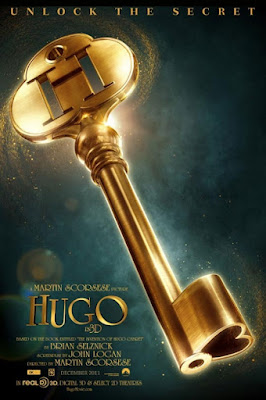Like The Artist, Hugo is a display of passion for cinema. Indeed, there are some uncanny familiarities here as this French-accented film also screams from the roof tops its adoration for the movies. Where they differ however is that while The Artist was a love story for the golden age of cinema in general, Hugo is a much more personal tale about film pioneer Georges Méliès, who saw movies not just as a gimmick but something literally quite magical. In many ways Hugo is also a much more tender, personal effort from Martin Scorsese.
To say Hugo is striking would be an understatement. Scorsese has created a stunningly well realised world where the majority of the action takes place in the railway station Gare Montpanasse, which unfortunately has since been torn down and was completely rebuilt in 1969. It is a setting which harks to the days of La Belle Époque and, while patently real, also seems very fantastical and dreamlike at the same time. More than anything you will fall in love with Hugo's exuberant setting, but this still remains very much alive, rich as much in character as it is colour and setting.
Hugo and Isabelle's inchoate romance sparkles while Ben Kingsley is superb as a wistful Papa Georges. Moreover however it is perhaps the supporting cast who add an exquisit finesse to proceedings. Hugo enjoyably treats us to little glimpses of the station regulars' lives, none of these more entertaining than Sacha Baron Cohen's crippled orphan-hunting station inspector. Sporting a ridiculous accent reminiscent of Arthur Bostrom's Officer Crabtree in 'Allo 'Allo, we are also invited to sympathise with this man when he reveals the reason for his disability. Likewise, a propitious Christopher Lee plays a bookseller who fondly dispenses novels with added gusto. There is a very real feeling to Hugo's characters, who are very much human in their complexities. And enjoyably so.
In many ways though, Hugo is only a perfunctory children's story. Scorsese makes no secret of the point he's trying to make here - that of the artistic consequences of Hollywood's cynical pursuit of profits. Like Méliès' films which were mostly lost when the French army melted them down to retrieve chemicals for the war effort, Hugo serves as a warning that the art of filmmaking may just as easily disappear once again in Hollywood's greed. But then we also have to consider that Hugo is in 3D, a money making scam if ever there was one. While Scorsese's choice to film in this medium may on the one hand raise accusations of profitting from the same gimmicks Hollywood espouses, one could equally draw parallels with Méliès own embrace of new film techniques. However it is the intent behind Hugo which should clarify which position it is. Admittedly Scorsese has rather interestingly made use of Hollywood's latest fad to remind us all of what great films are really about, and given the remarkable world created here you could indeed make the case that this kind of movie magic is what 3D is meant for.
Hugo is a lovingly detailed world full of wonderment and allure which will bring a fond tear to any cinephile's eye. Admittedly it can be a bit maudlin, but this is nonetheless enchanting to say the least. Hugo is as much a tale for all as it is a personal love letter to cinema from one of the greatest film romantics of our time.

0 comments:
Post a Comment